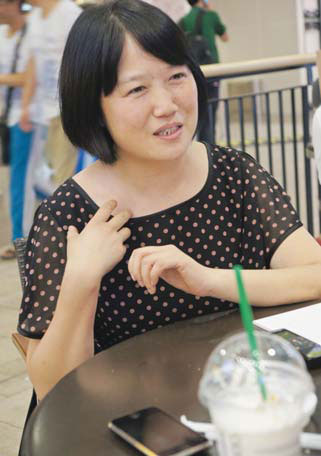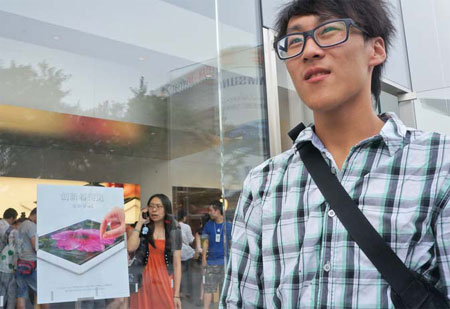Different strokes for different shoppers
Updated: 2012-08-10 08:56
By Andrew Moody (China Daily)
|
||||||||
|
Above: Yu Runze, a high school graduate in Beijing and a fan of Apple products. Below: Li Jianjun, a photography lecturer at Zhongzhou University in Henan province. Photos by Zhang Limingzhu / for China Daily |

Yu Runze is not only a fan of Apple products but wants to work for the company when he graduates in computer science from college.
The 19-year-old high school graduate is typical of many of China's young new consumers.
He was one of hundreds of shoppers crammed into the Apple store at the Joy City shopping mall in Xidan in Beijing.
"I just came to the store to learn more about the new MacBook Pro. I like the design of Apple products," he says.
"I am going to study software and computer science at college and it doesn't matter what I do afterwards so long as I can work for Apple."
European retailers such as Greek-owned fashion accessories brand Folli Follie was also attracting shoppers at its world flagship store in Oriental Plaza in Wangfujing, which opened in June. It sells simple rings from 500 yuan ($79, 63 euros) to 18,000 yuan necklaces and now has more than 100 stores in China.
Zhao Xiaoman, 34, the store's manager, says her main customers are independent professional women between 20 and 40.
"We have a lot of wealthy (Chinese) tourists from second and third-tier cities who have never heard of our brand but like the products and just buy them. Money doesn't matter to them," she says.
"The Western consumers we have here tend to be less spontaneous."
It is often glamour images from the West that influence the purchases of some consumers.
Tian Yanan, 20, a music student at the China Conservatory in Beijing and who is from Qufu in Shandong province, says she is more likely to buy a product if it is advertised using Western rather than Chinese models.
"I prefer to see a foreign model on a billboard. It gives me the impression the brand is international and has quality," she says.
Li Yue, 24, a student from Heilongjiang province who is about to start for a master's degree in Beijing, says her shopping habits are completely different to those of her parents.
"My parents are about 50. My father never shops and my mother only buys Chinese clothes brands like JNBY, Broadcast and Girdear," she says.
"I like Western brands such as H & M, Zara, C & A and Vero Moda, but I have to consider the price when I buy them because Chinese goods are cheaper."
Someone not so influenced by foreign brands is Wu Hansen, 26, from Fujian province and now an auditor with Ernst & Young in Beijing.
"I don't really care about the brands surrounding me. People want to buy high-profile brands to show how rich they are, especially when the products are English," he says.
"I tend to buy them only for parents as a way of telling them I have a good life and career in Beijing."
Linda Li, 21, an information technology student at Shanghai University of Electric Power, says some people go over the top with spending.
"I have a friend who is 20 and she is just brand crazy but buys things which are too mature for her and out of line with her status. They just make her look weird," she says.
Lu Ling, 41, who works for a State-owned company in Liaoning province, says living standards have improved but says she used to spend proportionately more on clothes 20 years ago than now.
"Then I would spend 80 to 100 yuan on dresses when my salary was 300 to 400 yuan a month. Now I spend between 1,000 and 2,000 yuan on them while earning less than 10,000 yuan a month. What you can buy, however, has radically changed," she says.
Li Jianjun, 47, a photography lecturer at Zhongzhou University in Henan, used to make her own clothes but says she wouldn't get away with it now.
"I still have emotional ties to self-made clothes but people expect you to wear better these days. My friends read all the fashion magazines and are very brand conscious," she says.
" I like Burberry and I have bought discounted Chanel dresses. For an important occasion I might buy a 3,000-yuan bag." She says she prefers Chinese cosmetics brands to Western ones.
For her, it is difficult to say whether China's new consumerism benefits society.
"You can't simply say whether it is healthy or unhealthy. Many of international brands the Chinese are buying have factories in China so it fuels the economy. I am not sure, however, whether it helps our cultural development," she says.
Deng Zhangyu contributed to this story.
andrewmoody@chinadaily.com.cn
(China Daily 08/10/2012 page5)

 Relief reaches isolated village
Relief reaches isolated village
 Rainfall poses new threats to quake-hit region
Rainfall poses new threats to quake-hit region
 Funerals begin for Boston bombing victims
Funerals begin for Boston bombing victims
 Quake takeaway from China's Air Force
Quake takeaway from China's Air Force
 Obama celebrates young inventors at science fair
Obama celebrates young inventors at science fair
 Earth Day marked around the world
Earth Day marked around the world
 Volunteer team helping students find sense of normalcy
Volunteer team helping students find sense of normalcy
 Ethnic groups quick to join rescue efforts
Ethnic groups quick to join rescue efforts
Most Viewed
Editor's Picks

|

|

|

|

|

|
Today's Top News
Chinese fleet drives out Japan's boats from Diaoyu
Health new priority for quake zone
Inspired by Guan, more Chinese pick up golf
Russia criticizes US reports on human rights
China, ROK criticize visits to shrine
Sino-US shared interests emphasized
China 'aims to share its dream with world'
Chinese president appoints 5 new ambassadors
US Weekly

|

|







